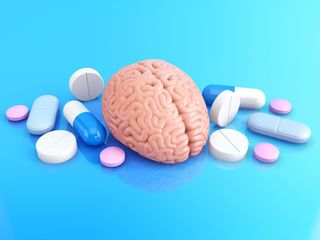Pregnancy
Five Things You Didn't Know About Antibiotics and Your Brain
Antibiotics can do funny things to your brain.
Posted March 25, 2019 Reviewed by Kaja Perina

We like our stories neat, with good guys in white hats and bad guys in black, but nature scoffs at our binary plot lines. An important and timely example of our tendency to oversimplify is antibiotic use.
Antibiotics are amazing life-savers, but they are not without side-effects. For one thing, they can have a surprising impact on our brain. Here are five little-known interactions between antibiotics and the brain.
1. The first antidepressant was an antibiotic.
In 1882, Robert Koch discovered that tuberculosis was caused by bacteria, and soon sanatoriums were established to deal with the contagious patients.
People with TB are often subdued, and sanatoriums were typically quiet, somber places. In 1951, researchers decided to trial a new antibiotic, called isoniazid, to treat TB bacteria. To their surprise, the patients had a weird reaction: they started laughing and dancing in the hallways. The staff found themselves shushing their normally reserved patients. The researchers realized that, by pure serendipity, they had discovered the first antidepressant. [1]
They found that isoniazid prevented the breakdown of neurotransmitters, including serotonin, dopamine, and epinephrine. The race was on to find new drugs that could affect neurotransmitters. That focus ultimately led to all the modern antidepressants, including Prozac, Wellbutrin, Zoloft, and others.
Virtually forgotten in all the hoopla: isoniazid is an antibiotic. As well as lifting mood, the drug alters the microbiota. This was an early glimpse at the connection between microbes and brain function, and it was swiftly forgotten.
2. Maternal antibiotics may affect brain development in the baby.
In third-world countries where infections are endemic, giving a mother antibiotics while pregnant can increase the odds that her baby will have a healthy birth weight. But in high-income countries, antibiotic use during pregnancy is associated with low birth weight. Why is that?
Most mothers don't know it, but they pass on more than their own genes to their children: they pass down microbial genes as well. So when mom gets sick or takes antibiotics, it can affect this microbial heritage. Maternal infections and antibiotic use during pregnancy are associated with increased rates of schizophrenia, autism, anxiety, and depression later in the child's life.[2]
Before you freak out, remember that associations don't imply causality, and antibiotics during pregnancy can save the life of both the mother and the baby. But it's worth keeping in mind that broad-spectrum antibiotics may also damage the microbiota in a way that can have a lasting effect on the child.
3. Childhood antibiotics may affect brain development.
The first 1,000 days of our childhood is special. That's when our immune system must learn to tolerate our beneficial bacteria. Although the details are still mysterious, the job must get done or we will forever be fighting our helpers, setting us up for long-term inflammation.
Getting it right is important: a proper microbiota helps our brain to develop normally.[3] Giving antibiotics during this accommodation period kills the bacteria we need to befriend. In mice, the lack of bacteria can cause an abnormal stress reaction. Providing those mice with a healthy microbiota puts them back on track, but only if they are younger than three weeks. After that, their stress response can't recover.
Humans are not mice, but infants who take antibiotics have a less diverse microbiota and are more likely to get IBD and depression as adults. If your child really needs them, don't hold back, but do your best to make this early training period as normal as possible.
4. Antibiotics can cause psychosis.
Doctors have documented a wide variety of mental complications with penicillin since 1945. The list of symptoms is long, including seizures, aphasia, spasms, psychosis, confusion, lethargy, anxiety, and coma. Doctors have recently documented more cases of seriously disrupted brain function in people, especially the elderly, taking antibiotics other than penicillin. [4]
It's not clear what the process is that leads to brain malfunction, but studies show a diminishment of the neurotransmitter GABA. Many antibiotics have a structure that mimics GABA and – if they can breach the blood-brain barrier – may clog up GABA receptors. Contributing factors might include the death of GABA-producing bacteria, or endotoxins released by the killed bacteria.[5] Or, as is often the case with biology, all of these may play a role.
The good news here is that when the antibiotics are discontinued, these cases typically resolve quickly.
5. Antibiotics can cure certain psychoses.
If you're a doctor or nurse, you probably know about this one. Hepatic encephalopathy, as the name implies, is a liver problem that affects the brain. It can cause anxiety and profound personality changes. It is not new: Hippocrates made note of patients with liver disease and bad tempers. He said, “Those who are mad on account of bile are vociferous, vicious, and do not keep quiet.”
The culprit is ammonia, which causes edema in the brain. If untreated, it can lead to coma and death. The ammonia is a product of certain gut bacteria. One treatment is lactulose, a sugar that is consumed by lactobacillus bacteria, which then lowers the pH in the gut. That increased acidity kills off many of those ammonia producers.
Another treatment is rifaximin, an antibiotic that acts directly on gut bacteria. The ability to treat this particular psychosis with antibiotics is another reminder of the unexpected impact our gut bacteria have on our brain.
The upshot
Antibiotics are amazing drugs that have saved millions of lives, but in nature, nothing is black and white. The five stories told here demonstrate that the gut-brain connection is vulnerable to antibiotics. That's an interesting thing to consider the next time you get an infection.
References
[1] Butler, Mary I., Kiran Sandhu, John F. Cryan, and Timothy G. Dinan. “From Isoniazid to Psychobiotics: The Gut Microbiome as a New Antidepressant Target.” British Journal of Hospital Medicine (London, England: 2005) 80, no. 3 (March 2, 2019): 139–45.
[2] Gur, Tamar L., Brett L. Worly, and Michael T. Bailey. “Stress and the Commensal Microbiota: Importance in Parturition and Infant Neurodevelopment.” Frontiers in Psychiatry 6 (2015).
[3] Stilling, Roman M., Seth R. Bordenstein, Timothy G. Dinan, and John F. Cryan. “Friends with Social Benefits: Host-Microbe Interactions as a Driver of Brain Evolution and Development?” Frontiers in Cellular and Infection Microbiology 4 (2014): 147.
[4] Bhattacharyya, Shamik, Richard Darby, Pooja Raibagkar, Luis Gonzalez Castro, and Aaron Berkowitz. “Antibiotic-Associated Encephalopathy: A Comprehensive Review of 391 Reported Cases (P3.383).” Neurology 86, no. 16 Supplement (April 5, 2016): P3.383.
[5] Grill, Marie F, and Rama K Maganti. “Neurotoxic Effects Associated with Antibiotic Use: Management Considerations.” British Journal of Clinical Pharmacology 72, no. 3 (September 2011): 381–93.




